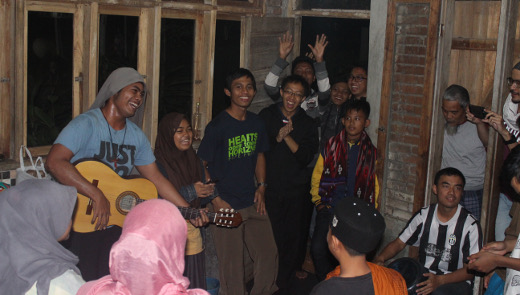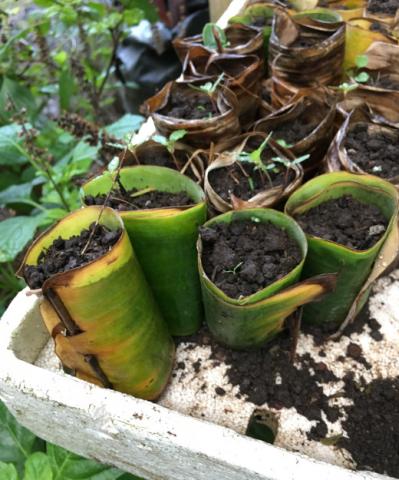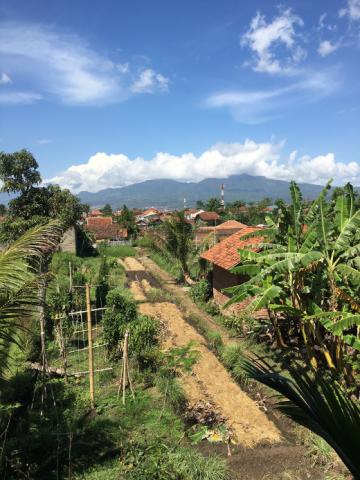 Indonesian scholastic Tiro Daenuwy SJ shares what he learnt from his immersion experience in an Islamic boarding house in Garut, West Java, Indonesia. The five-day immersion held from July 29 to August 2 is a vital part of the Asia Pacific Theological Encounter Programme, a formation programme in contextual theology with a focus on Islam that is conducted annually by the Jesuits in Indonesia. Part 2.
Indonesian scholastic Tiro Daenuwy SJ shares what he learnt from his immersion experience in an Islamic boarding house in Garut, West Java, Indonesia. The five-day immersion held from July 29 to August 2 is a vital part of the Asia Pacific Theological Encounter Programme, a formation programme in contextual theology with a focus on Islam that is conducted annually by the Jesuits in Indonesia. Part 2.

There were about 20 santris (students) living in Pesantren Ath-Thariq, when we stayed there for our immersion. On our third night, one of our scholastics picked up the guitar and all of us, including the female santris, gathered around him singing cheesy Indonesian pop songs about love. We stayed up until 11 pm, singing in the hut where they learn to recite the Qur’an in the cold mountain breeze.
There are no television sets in sight in the pesantren. Playing outside and socialising are highly encouraged. They take in santris as young as eight to those who are college students. Everyone contributes to the livelihood of the pesantren, whether it is preparing food or harvesting, and they all learn the Qur’an together.
We were surprised that some of the children come with emotional baggage – from broken families to psychological disabilities. One male santri was rather effeminate and spent more time in the kitchen with the girls but not once did the others bully him. We asked Abi Ibang, who runs the pesantren with his wife Umi Nissa what his policy was, and his answer was that everyone there is treated with dignity and respect despite their uniqueness.
Before opening the pesantren, Abi Ibang and Umi Nissa had been activists. In 2000, they established Serikat Petani Pasundan (Sundanese Farmer’s Union), which became one of the largest farmer’s unions in Indonesia with more than 50,000 members.
At 4 am every morning, Abi gathers the santris to read and recite the Qur’an until 6 am, when they go to school until 2 pm. They continue to learn the Qur’an at 5 pm and on some days till 9 pm. On weekends, the santris learn agro-ecological farming with Abi and Umi in the 8,500 m2 land that they live on. They also learn how to process the products and turn them into food and medicine.
 Amazingly, the fruit of the land is sufficient to feed 30 mouths. They eat what the land gives them. All their plants are non-GMO (genetically modified organisms) and are endemic species, which have no market value but are rich in nutrients. Native plants and crops are low-cost since they do not require special fertilisers and pesticides. Instead of using poisonous pesticides, they grow flowering plants to divert the attention of pests and provide homes for natural predators to help control the mice population. They fertilise the land with solid fertilisers as well as liquid fertilisers created from indigenous microorganisms bred in recycled jars.
Amazingly, the fruit of the land is sufficient to feed 30 mouths. They eat what the land gives them. All their plants are non-GMO (genetically modified organisms) and are endemic species, which have no market value but are rich in nutrients. Native plants and crops are low-cost since they do not require special fertilisers and pesticides. Instead of using poisonous pesticides, they grow flowering plants to divert the attention of pests and provide homes for natural predators to help control the mice population. They fertilise the land with solid fertilisers as well as liquid fertilisers created from indigenous microorganisms bred in recycled jars.
Their main income comes from selling the dried medicinal herbs they consume daily. The students learn to not depend on rice, but to eat other staples such as cassava, plantains, and corn. Their diet is about 90 percent vegetarian; they only eat meat during Eid. For personal hygiene, they use the extract of a native fruit called lerak, which is also used to wash clothes, clean furniture, glass, and silverware.
 Umi Nissa is like a walking dictionary when it comes to agro-ecological farming while Abi Ibang comes from a respected bloodline of Muslim clerics in West Java. Both are well versed in social activism to defend the rights of the farmers. This coupling of Islamic spirituality with how-to-do knowledge creates a power couple that keeps on giving back to the community.
Umi Nissa is like a walking dictionary when it comes to agro-ecological farming while Abi Ibang comes from a respected bloodline of Muslim clerics in West Java. Both are well versed in social activism to defend the rights of the farmers. This coupling of Islamic spirituality with how-to-do knowledge creates a power couple that keeps on giving back to the community.
In one of our sessions, Umi explained how the green revolution has impacted the farmers in West Java. The introduction of GMO crops has forced local farmers onto an uneven playing field. The market demands high-yield crops that require pesticides as well as fertilisers that are controlled by middlemen, and the current government of Garut is not doing much to help the farmers. Instead, land is being cleared for plantations, housing compounds, factories, and mines. This is where Abi comes in. After showing us some composting techniques, Abi joined the farmers of Garut to rally in front of the regent’s office against his corrupt practices. Some of us accompanied Abi and saw how well loved and respected he is by the activists and officials.
Abi and Umi gained the respect they have from being consistent with what they preach and generous with what they have. By becoming loving and nurturing parents of the earth, they have also become nurturing parents to the santris, farmers, and also us Catholic seminarians who spent five incredible days at Pesantren Ath-Thariq.
Related story: A beacon of hope

